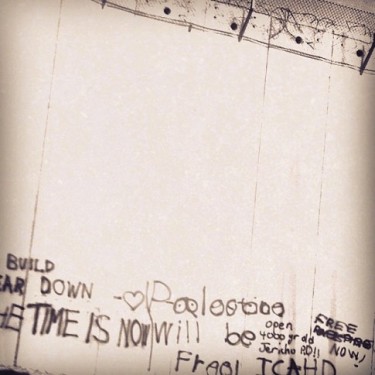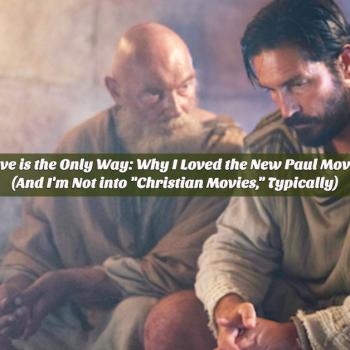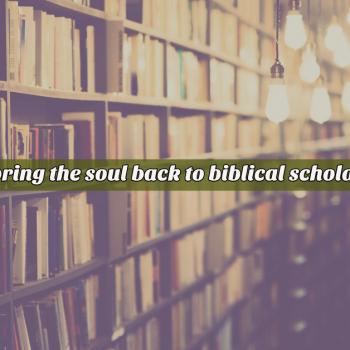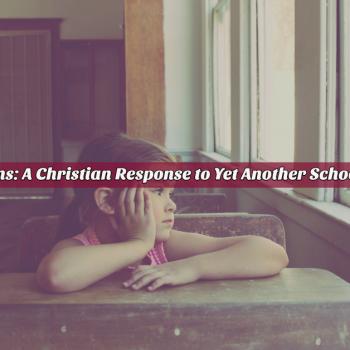Over the past several weeks, my heart has grieved the violence taking place in Gaza. Hamas hurts the cause of all Palestinians when they shoot their homemade rockets over the wall at innocent civilians in Israel. And Israel perpetuates the desperation of groups like Hamas with their unjust policies, walls, and discrimination. Both sides of the story need to be told. A better future is possible–but it won’t come through violence. Violence begets violence–every time.
Most Christians, I hope, agree that war isn’t helpful. The ridiculous number of Palestinian civilian casualties and deaths testify to this reality. But so often I’ve read many folks’ comments who appeal to this conflict through the grid of justified violence and theories. So much of the rhetoric often dehumanizes the “other” rather than actually seeing in each victim one created in the image of God (and here I’m thinking of Israeli civilian victims also, who fear for their lives when rockets start coming over the wall).
Some say: “Until Palestinians denounce rhetoric about Israel’s right to exist I won’t feel compassion for them.” Unfortunately the same sorts of things are said about the Palestinian people from the Israeli side of the wall (and even within Palestinian territories where settlements exist). I personally saw banners that had just been placed all around the division point of the Israeli settlement in Hebron that said “Palestine never existed” and other violent language (sadly funded by American zionists). So, we need to name the language games that are played by extremists on both ends of this conflict.
But, are extremists the only faces and names that we need to consider in this conflict? I. Sure. Hope. Not!
But before we go on to talk about people that are easier to get along with, let’s not forget the Christian demand of discipleship: “Love your enemies.” Central to the Gospel announcement of Jesus is the nonviolent love of those who would oppose us: sometimes physically and other times ideologically. At the center of discipleship is love–love for God and for neighbors. And lest we forget the criteria for a “neighbor,” Jesus makes that clear in the story of the Good Samaritan: a neighbor is the person we naturally hate. For a Jew in the first century to even acknowledge a Samaritan as anything but a despised traitor to the God of Israel was unthinkable! Yet that is exactly what Jesus called his hearers to–to equate enemies to the status of neighbor. Therefore, a neighbor is any and every person on the face of this earth that we like, dislike, or would even consider an enemy. We are called to love our enemy-neighbors.
Can you love a neighbor while cheering on their destruction? No. Can you love a neighbor while shooting them? No. Therefore, we as Christians should have no skin in the game regarding the current conflict except to seek peace and love. Justifying the death of kidnapped teens in Israel or the bombing of children on a beach in Gaza doesn’t fit Jesus-centered conversation. Jesus is morally opposed to both scenarios.
Of course nations aren’t “Christian” so we can’t expect them to act out of our own Christian values. However, we should expect that Christians would embody Christian values during times of violence and destruction. For Christians, when we see our Palestinian friends being tormented by the American-funded Israeli military machine–we should see the faces and names of image-bearers. And when we hear about the fear that many Israelis experience on a regular basis due to indiscriminate rocket fire from Hamas–we should see through their fear and discover human beings created in the image of the Divine.
Most Westerners haven’t had the opportunity to visit Israel/Palestine to look human beings in the eyes. I was fortunate to spend ten days in the region this past winter with The Global Immersion Project. I visited both Israeli regions and the West Bank. And let me tell you this: on both sides of the wall are WONDERFUL humans who are kind and hospitable. Both live with lingering fear. But both also have hope. Peacemakers on both sides of the wall desire peace and justice to become normative.
I asked one Israeli and one Palestinian friend to give me their own perspectives on the current conflict. If we are going to humanize this issue, we need to hear from credible sources on the ground. Granted, these are just two perspectives–moderate perspectives–but it’s a start.
Milad (a Palestinian Christian peacemaker) and Liel (an Israeli peacemaker):*
In what follows I want to offer a few insights offered by each of these friends. Both are wonderful human beings. Milad leads a community center that is making a powerful impact in the West Bank. Liel is a peace activist who has facilitated Israeli-Palestinian sharing circles and organized Arabic learning groups.
In a war like this one, relevant information changes on a daily basis. These comments were put together a couple weeks ago, so they might need to be nuanced on some minor points. Liel responded on 7/27 and Milad on 8/4. Much has unfolded since these initial responses came in, but they help frame the situation for us.
Milad: [When I asked about experiences in the West Bank…] In the West Bank it more than fear: it is about human rights and the killing of civilians. We feel sorrow and sadness for our brothers and sisters in Gaza. What is happening is a war crime and the world is silent… and United Nations too. The images we see [in the media] create anger, revenge, and violence. I don’t see hope; we are seen as numbers not humans.
Liel: [When I asked about experiences of Israeli citizens…] I’m not an average Israeli and because we Israelis are very different from each other, it is very difficult to define. But in general, I can say that the common feeling is frustration and fear. The question is: from what and why? Some have these [negative] feelings towards Palestinians, others towards [Israeli] Leftists and some because of the [Israeli] Right Wing.
Milad: [As a Palestinians Christian…] Moments like this keep my spirit in continuous prayer. As Christian Palestinian we are [part of] one nation with our Muslim brothers. It is a real challenge to see the evilness of war and killing toward us Palestinians..and the [cycle of] revenge and discrimination. We as peacemakers have hope in Christ Jesus. He is our savior from the death and evil. Hate and not recognizing the “other” with pride kills everyone here. I believe God is in control and will bring peace.
Liel: [As an Israeli who believes in peace,] I believe the situation is dialectical In some way. On the one hand, this escalation challenges my beliefs as it exposes clearly the violent actors in this conflict that need to be confronted. Not convinced, but really confronted in order to weaken their actions and strengthen the opposite direction. In calmer periods it is often easy to believe that you can convince everyone but now some enforcement and confrontation seem legitimate as well. On the other hand, the same specific escalation together with its violent actors exposes more clearly the people that work for peace. One extreme is bringing light to the other side which brings hope to the alternative.
Milad: [What Americans should know is] that the country of Israel is against international laws and human rights. We [Palestinians] are not slaves–we are people. Americans should stop supporting a criminal state. Through your tax dollars you are killing a child; you are destroying a school; you are poisoning our dreams. You are investing in war. If you love Israelis that is fine. But don’t forget that there is a Palestinian child without a school or that he doesn’t have food or that he is without house. By the way, more than 500 house or more was destroyed [based on when this response was originally written]. We need Americans to support our freedom, justice, peace and reconciliation. We need your voices to end occupation and this apartheid system. The two nations are tired from fear, hate, and violence. We want to move freely in our countries and not to feel that we are unwelcome or foreigners. We are tired from negotiation and peace processes. We want real steps toward peace. If violence will bring our peace, we all will go for it, but we know that it isn’t the solution. As Martin Luther King Jr. said: I have a dream. We’ve been dreaming for almost 64 years. To seek nonviolence we need courage, hope, faith, and salvation. We need love and reconciliation. We need humbleness and the occupation needs to end.
Liel: [What I hope Americans will hear from me is that…] When two kids are fighting, the parent gets in the middle strongly in order firstly to separate them. The parent doesn’t offer other options, try to learn the local narratives or even declare that the sides know what is best for them. We don’t know. Americans must know that they are the parent or minimum the big brother in this conflict. [Editor note: I think Liel is encouraging us Americans to get to know the local narratives, etc. As we learn from both sides we then can help discern the things that will make for peace.]
Concluding Thoughts
Milad and Liel are humans directly affected by this war. In Liel, you have the perspective of a thoughtful and compassionate Israeli. (And without getting into another story, I’ve witnessed Liel’s compassion firsthand toward a Palestinian child). In Milad, you have a Christian wrestling with the pain of witnessing friends and family killed. Not only so, but Milad is in the emotional mix of this very human conflict. Even when it isn’t violent, each day his people suffer from a lack of resources and dehumanizing restrictions imposed by the Israeli government and Defense Force. He (and his family and co-workers) are sources of light and love in his neighborhood and town even in the midst of instability.
In both of these perspectives, I see hope. I see that peace is possible. It may require a radical shift in how Israel relates to its Palestinian neighbors. But ultimately, this will be fueled by peacemakers who decide that there are human beings on both sides of the walls. As Palestinian Muslim Peacemaker Ibrahim Ahmad Abu El-Hawa said when we were sitting at a dinner table in Jerusalem: “The hardest walls to topple are the walls of fear the separate our heads from our hearts.” It’s time to conquer fear with humanizing love.
*I helped clean up language on a few points but kept the essence of their comments in tact–to the best of my ability. I was honored that my two friends were willing to contribute to this article.












